
Sonora, Mexico - The people who carried out acts of vandalism during the protests held in Los Angeles, California, are not necessarily Mexican immigrants. In fact, if the images are analyzed in detail, the protesters do not have the characteristics of Mexican nationals, according to David Figueroa Ortega.
With the experience gained after serving as Mexican Consul General in San Jose, California, from 2008 to 2011 and later in Los Angeles from 2021 to 2013, Figueroa Ortega maintains that those who broke the law during the march wore the insignia of other movements that were not in favor of Mexican interests.
Now a deputy of El Partido Verde Ecologista de México (The Ecologist Green Party of Mexico), he is concerned about the current situation of violence in Los Angeles and other parts of the United States, which is a result of the criminalization of immigration.
Protest is a social tool that should be used peacefully; however, there is a bias toward violence that is inappropriate because it stigmatizes migrants as criminals, he said."In that sense, the people who committed these acts of vandalism must face the law. The call is to protect the migrant population and not make statements that disrupt a peaceful protest," he said.
It's sad that the raids are being carried out in sanctuary cities, he added, since many of them have grown due to migrant populations, and in the case of Los Angeles, authorities have a history of this type of racist behavior.
One of the clearest examples we remember is the Rodney King case, he mentioned. This behavior by the authorities rekindles a sense of protest and social rejection.
Regarding the work of the Mexican Foreign Ministry, Figueroa Ortega said that consular protection should be strengthened through lawyers to provide legal assistance to detainees, and that a support network involving civil society organizations should be established.
MIGRATION The migration conflict escalates bilateral relations
As a result of President Donald Trump's anti-immigrant policies, a crisis has emerged between the U.S. federal government, the state of California and Mexico, which will ultimately lead to dialogue between the two countries, Figueroa Ortega said.
On May 24, Mexican President Claudia Sheinbaum criticized the United States for its proposal to impose a 3.5% tax on remittances sent by Mexicans.
During an event, the president forcefully stated: "We will continue to report because, if necessary, we will mobilize, because we do not want there to be taxes on remittances from our fellow countrymen in the United States to Mexico that serve those most in need."
Days later, protests erupted against the ICE raids in Los Angeles, and on June 10, U.S. Secretary of Homeland Security Kristi Noem accused the Mexican president of fueling the violence by criticizing the U.S.
“Claudia Sheinbaum criticized and encouraged more protests in Los Angeles. She shouldn't encourage violent protests. People have the right to peaceful protest, but this violence cannot occur in the United States,” Noem said.
The Mexican president denied having incited the protests and called the allegations false. She also condemned the violence that occurred at the march: “We do not agree with violent actions as a form of protest. The burning of the police car seems more like an act of provocation, and we call on the Mexican community to act peacefully.”
As a result of these confrontations, the Mexican president held a nearly two-hour meeting with U.S. Undersecretary of State Christopher Landau on Wednesday. Neither official has provided details of the meeting.
From his perspective, David Figueroa rejected any accusations of incitement by President Sheinbaum in her last speech. He even called the Mexican president a pacifist and noted that she has always sought dialogue with the United States on recent bilateral issues such as the tax on remittances and the application of tariffs on Mexican products.
In a statement sent to the local Congress, Figueroa Ortega stated: “Given the recent events in Los Angeles, California—where thousands of people have come out to protest against immigration raids implemented by U.S. federal authorities—the Commission on International, Border and Migrant Affairs of the Sonora State Congress expresses our deep concern and firm rejection of any action that violates the human rights of the migrant community, particularly our Mexican brothers and sisters.
“At the same time, we express our support for the actions of the Mexican government, led by our President Claudia Sheimbaum, and we trust that consular assistance will continue to be strengthened, diplomatic efforts will be expanded, and legal support and comprehensive assistance will be provided to detained individuals and their families.”
Actions by the Mexican Consulate and Foreign Ministry
Through his official accounts, the Mexican Consul General in Los Angeles, Carlos González Gutiérrez, reported that as of Friday, fewer than 50 migrants had been detained in the Los Angeles raids.
There has been an increase in detentions of people attending court dates, he said, and therefore, staff from the consulates in Los Angeles, San Bernardino and Santa Ana are visiting the detention centers to search for Mexicans.
If you have a court date, he advised bringing a lawyer with you or arranging a virtual hearing.
If you are detained, he said, it is important to be respectful, remain calm and not resist the authorities. Do not lie or provide false documentation. Do not sign documents you do not understand. Remain silent and contact the consulate or call 520-623-7874.

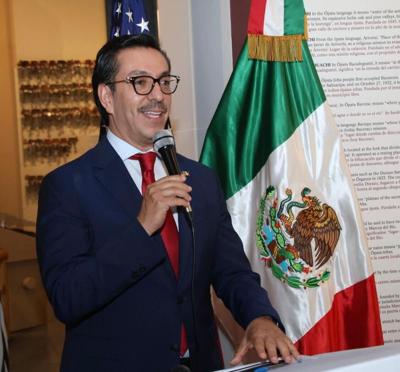
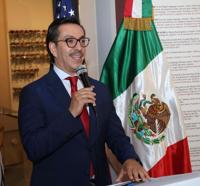


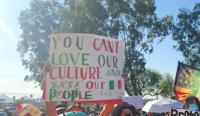

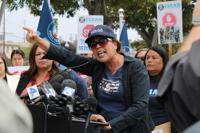

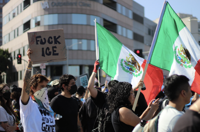
(0) comments
Welcome to the discussion.
Log In
Keep it Clean. Please avoid obscene, vulgar, lewd, racist or sexually-oriented language.
PLEASE TURN OFF YOUR CAPS LOCK.
Don't Threaten. Threats of harming another person will not be tolerated.
Be Truthful. Don't knowingly lie about anyone or anything.
Be Nice. No racism, sexism or any sort of -ism that is degrading to another person.
Be Proactive. Use the 'Report' link on each comment to let us know of abusive posts.
Share with Us. We'd love to hear eyewitness accounts, the history behind an article.